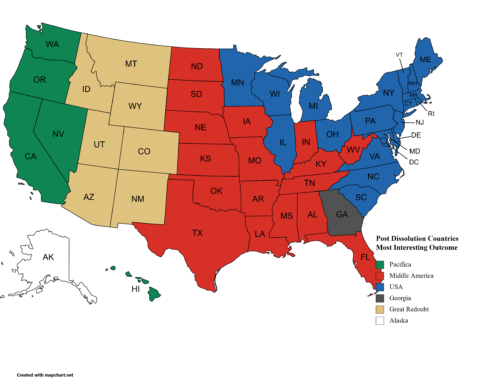A family member once asked me during a home viewing of The Hunger Games what the point was of watching something that was so fantastical and obviously could never happen. I responded that this was not fantastical at all, but a fictionalization of human history. “When? When did this happen?” Well, I said, how about the Roman Empire when wealthy Romans dressed themselves to stand out from one another while watching defeated captives fight each other for others’ amusement. Slaves, gladiators, wild beasts. Yes the Hunger Games was a dystopian future based on a historical past.
This begs the question of whether we will ever learn and set triggers for ourselves such that when we reach a particular situation, some alarm sounds to say ,”STOP! Read XX.” That might be Thucydides’ History of the Peloponnesian Wars. It might be the history still being written on the Bush Administration decision to go to war in Iraq in 2003. It might be Charles Emmerson’s 1913 or Robert Waite’s The Psychopathic God.
But to someone would have to set up the warning and a mechanism to ensure that alarm will persist through time. And those establishing the warning would have to presume that those in positions to avert disasters would actually be open enough to learn from the past and be humble enough to change course. And that is where the watchdogs would be wrong. No matter how much we think we are reading about a situation so as to not repeat past mistakes, people are human. That means instead of seeing that we are making the same decisions at the same timelines to the same variables and that that will likely take us to the same conclusion, we actually find ways to justify what we want to do no matter what warnings historical evidence shows us.
Michael McKeating, writing in Gilbert! magazine, effectively argues G.K. Chesterton wrote about anarchy so effectively not out of his fantastical literary mind, but because he lived through decades of anarchist attacks on royalty an political leaders across Europe. Mocking the anarchists as “full of phrases about Sociology and Capitalism and the means of production,” Chesterton says, “when they come to murder they step back into the sixteenth century.” So it is today when IS uses its minions to blow themselves up and cause panic in big cities and mistrust among a country’s people.
Westerners cannot accept that there are so many disaffected people in the world, and in our own “advanced” or “Western” countries that there is a seemingly never-ending supply of bomb-throwers or suicide bombers. Like ages past, those at the top of the socio-economic strata cannot understand how desperation leads people to do act in ways completely rational to them but completely irrational to those who are comfortable in life. Instead of stating how lawless and degenerate people are when they light their own neighborhoods on fire, people ought to reverse the question and ask how miserable must life be for people to act in such a manner.
But what happens when those at the top of the socio-economic strata are faced with trials? Do they lift their people out of anarchy or do they add to it? The Economist, writing about the effects of an electromagnetic pulse (EMP) attack brings up the case of how bad things can turn and how quickly. In Chile, after an earthquake in 2010, martial law had to be declared when only three hours after a power outage, even relatively wealthy people began looting and “With electricity gone, normal rules had suddenly vanished.” We intrinsically know this is possible in our own country, be it Canada, Britain, Serbia, or the US. We just cognitively dissociate the possibility with the reality of our nature.
Think of what would happen in a large city like New York or Los Angeles or Toronto if the massive, complicated and resource-dependent unseen and unconsidered system of food supply was taken down by a power failure. Would people be kind to one another and share whatever food they had with their neighbors or would they steal? How long before looting would start in even the highest end postal codes? Just take a few minutes to think about what has happened during blackouts on the East Coast of the US or in Los Angeles or San Diego. Just look at what has happened and ask whether anyone will stop it from happening again in future power outages.
In the mid-2000s remake of Battlestar Galactica, a recurring theme was that humanity could not run from its mistakes. That there are natural, unavoidable consequences to our actions. But we only think of the most likely beneficial outcomes of our proposed innovations. We overstate the benefits and nearly always disregard the negatives. Harvard’s Professor Edward Glaeser, author of Triumph of the City, eloquently argues that cities are mankind’s greatest invention. I will never deny the benefits of the city. I will also not pretend that the city would be the worst place to be in the event of a prolonged power outage, targeted cyber attack or natural disaster that isolates the populace for days.
In a similar sense, man proceeds with automation and the quest for artificial intelligence thinking only of the possible benefits and ignoring likely negative outcomes. The promises of greater efficiency with fewer errors and diminishing labor costs are tremendous for the business owner, but they are devastating for the workers who are replaced. And it is easy for high-salaried economists to say that these replaced workers will be free to find other, less manual labor, but they won’t be the ones that are jobless searching for lower-paying service industry jobs. And going further, despite warnings of scientists and innovators alike (read Elon Musk’s arguments against), governments and corporations alike are working to develop artificial intelligence without openly addressing the necessary implications of such a strategy. In the Galactica series, the Cylons say that Humanity’s children have come home. None of the humans expected what they saw. We don’t expect today that our early experiments into AI will produce a Cylon. But we cannot pretend to know where such efforts will naturally proceed. We certainly didn’t expect robots jumping and doing backflips.
I’m not saying we should all be preparing for a zombie apocalypse. I’m not saying people should not live in cities. There are a lot of cities I really love. But I wouldn’t want to be stuck in one when the power went out. I’m saying we should consider the potential negative outcomes of any actions as much as possible positive ones. That goes for individuals leaving a comfortable job to follow a passion which likely won’t pay and it goes to countries making war. I, myself, have said often that just because the Soviets lost in Afghanistan didn’t necessarily mean the US would also. But that didn’t mean I thought the US would win, either. Were the conditions the same? If so, then likely the outcome would be the same.
We’ve talked before about the fact that there is no magic pixie dust and that truth doesn’t change based on the rank of the recipient. The same goes for thinking about the future. No matter how much you’d like people to always be nice to each other, you can’t pretend that throughout human history, people have socially devolved in times of trouble. But we also know that humanity has advanced and overcome our situations. We made it through the dark ages. We invented electricity. We put men on the moon with calculations made by slide rules and pencils. Whatever we screw up, we will figure out a way to come back. But wouldn’t it be nice if we didn’t make the mistakes in the first place. Wouldn’t it be nice if we sometimes accepted good enough and didn’t disregard the negatives to try to gain some promised betterment?
I’ll go ahead and have extra water and supplies on hand and accept whatever scorn some may try to pile on. So what if I never use them?
Keep thinking…






Leave A Comment